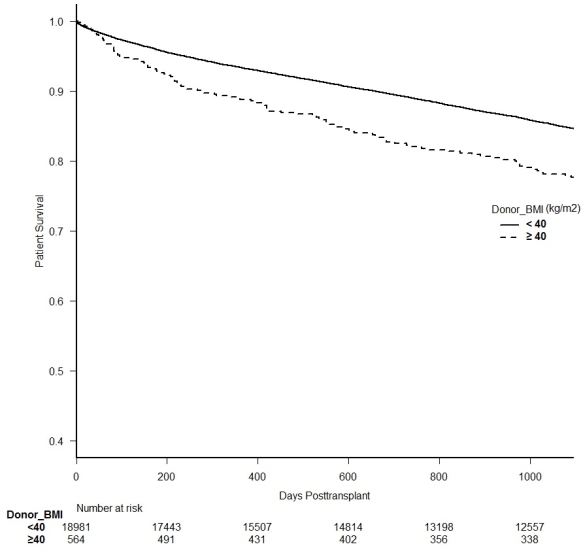Impact of Elderly Donor Obesity on Long-Term Outcomes in Renal Transplant Recipients
1Nephrology, University of Cincinnati, Cincinnati, OH
2Environmental Health, University of Cincinnati, Cincinnati, OH.
Meeting: 2018 American Transplant Congress
Abstract number: C60
Keywords: Kidney transplantation, Obesity, Risk factors, Survival
Session Information
Session Name: Poster Session C: Kidney Donor Selection / Management Issues
Session Type: Poster Session
Date: Monday, June 4, 2018
Session Time: 6:00pm-7:00pm
 Presentation Time: 6:00pm-7:00pm
Presentation Time: 6:00pm-7:00pm
Location: Hall 4EF
Background: There has been a dramatic increase in obesity in the United States. Due to longer waiting times, utilization of kidneys from older donors has also increased. However, the impact of obesity in elderly donors on kidney transplant outcomes is not known.
Method: United Network for Organ Sharing Standard Transplant Research and Analysis data were analyzed and we evaluated 19,545 adult renal transplants from elderly donors ≥ 60 years between January 2000 and December 2016. Using a multivariable logistic regression model adjusted for recipient, donor, and transplant covariates, we examined the effect of BMI in elderly donors on 1-year death-censored graft loss (DCGL) and 1-year mortality.
Results: Elderly donor organs accounted for 7.8 % of all transplanted kidneys. Mean age of donors was 64±3.9 years and mean age of recipients was 60±11 years. Overall, 1-year DCGL was 7.3% and 1-year mortality was 6.7 %. In the adjusted analysis, donor BMI was not significantly related to 1-year DCGL. Similarly, donor BMI was not associated with worse patient survival for donor BMI categories < 40 kg/m2; however, donor BMI ≥ 40 kg/m2 was independently associated with 1-year mortality compared to BMI of 18.5-24.9 kg/m2 (OR, 1.5; 95% CI, 1.10-2.01, p<0.01).
| 1-year DCGL | 1-year mortality | |
| BMI | OR (95% CI),p-value | OR (95% CI),p-value |
| 18.5-24.9 | Ref | Ref |
| <18.5 | 1.00 (0.67-1.51), 0.99 | 1.2 (0.80-1.84), 0.37 |
| 25-29.9 | 0.93 (0.82-1.07), 0.32 | 1.1 (0.96-1.28), 0.16 |
| 30-34.9 | 0.99 (0.84-1.17), 0.93 | 1.1 (0.95-1.34), 0.18 |
| 35-39.9 | 0.79 (0.61-1.02), 0.07 | 1.3 (0.99-1.62), 0.06 |
| ≥40 | 1.23 (0.92-1.65), 0.16 | 1.5 (1.10-2.01), <0.01 |
Unadjusted patient survival was statistically significant between donor BMI ≥ 40 kg/m2 and less groups (p<0.001).
Conclusion: BMI ≥ 40 kg/m2 in elderly donors is associated with 50% increase in 1-year recipient mortality although no significant influence in 1-year DCGL. Additional investigations are needed to understand the cumulative impact of elderly donor obesity.
CITATION INFORMATION: Yamada M., Jandarov R., Kaur T., Shah S. Impact of Elderly Donor Obesity on Long-Term Outcomes in Renal Transplant Recipients Am J Transplant. 2017;17 (suppl 3).
To cite this abstract in AMA style:
Yamada M, Jandarov R, Kaur T, Shah S. Impact of Elderly Donor Obesity on Long-Term Outcomes in Renal Transplant Recipients [abstract]. https://atcmeetingabstracts.com/abstract/impact-of-elderly-donor-obesity-on-long-term-outcomes-in-renal-transplant-recipients/. Accessed February 18, 2026.« Back to 2018 American Transplant Congress
